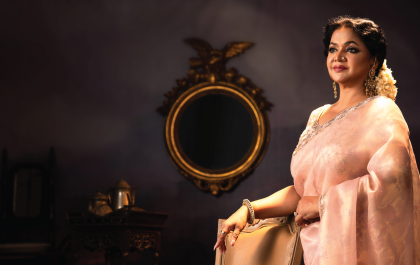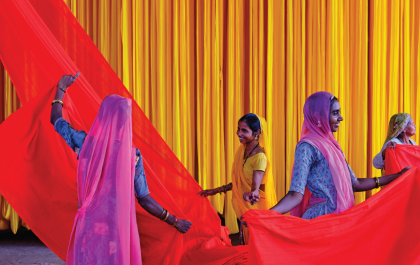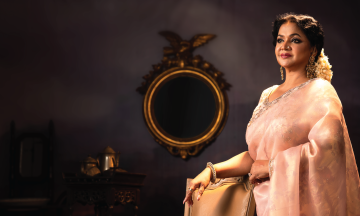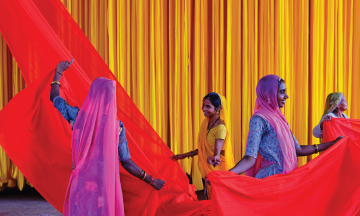By Faruque Ratul
Veteran thespian Afzal Hossain reminisces about his lengthy and luminous career in theater and on screens big and small
In Mostofa Sarwar Farooki’s Ladies and Gentlemen, we see him effortlessly portraying a dark character completely contrary to his image. In Syed Ahmed Shawki’s Karagar, he plays the role of an enigmatic, mystical head hangman at Dhaka Central Jail, a man with a dark and violent past, and strange spiritual leanings. In Amitabh Reza Chowdhury’s Bodh, we see him as a retired judge with dementia and a guilty conscience. It is hard to reconcile any of these images with the idea of the idealistic doctor from Bohubrihi. But that’s Afzal Hossain for you. Actor, director, artist, he is a man of many talents and is riding the Bangladeshi screen renaissance with a number of complex, nuanced roles and performances. The Ekushey Padak awardee recently sat down with MWB over a Zoom call to reflect on his journey so far.
You started your career with theater in the mid-seventies. Could you please share what Dhaka’s theater scene was like when you started acting?
After independence, theater became a very important aspect of our culture. The plays being staged during that time reflected what the young thespians were thinking. They showed a clear attempt to come out of existing norms, and showing new thoughts through stage productions. A lot of experimentation was going on in the theater arena.
The connection with the audience was soon established. People were turning up to the theater in large numbers. We’d often have full houses. Even people who came from outside of Dhaka, would take time out to watch a play.
I was studying at Dhaka Art College at the time. Around the end of 1974 or the start of 1975, there was an event organized to celebrate the 25 years founding anniversary of Dhaka Art College. The convenor for the event was Artist Rofiqunnabi and I was the cultural secretary. I suggested staging a play at the event to add novelty. Maruf Ahmed, the son of the famous actor Enam Ahmed, was a senior at my college, and he was friends with popular actor and playwright Al Mansur, having acted together in Khan Ataur Rahman’s Abar Tora Manush Haw (which also featured Raisul Islam Asad). Al Mansur acquiesced to the request for writing a play, and wrote Bidaay Mona Lisa.
We, the students of Art College, had no prior experience of staging a play at the time. The theater troupe Dhaka Theatre helped us stage this. This was my first acquaintance with the troupe, about whom I knew very little. Bidaay Mona Lisa was staged at TSC, and I played a role in the production. After the play, Nasiruddin Yousuf Bacchu, the director of Dhaka Theatre asked me if I was seriously interested in theatre. I had no idea what theater was. But I certainly wanted to know what it was all about, so I joined Dhaka Theatre. I was intrigued to see the massive public interest in theater and theatrical play; so much so, that I decided to stay on.
Who were some of your contemporaries at the time? How has your working chemistry evolved with them over time?
Around the time I joined Dhaka Theatre, the existing members of the troupe had already gained name and fame as actors. TV sets had not reached all households yet. But still the mass had a lot of curiosity and interest in this medium. Naturally, there was a tremendous amount of public interest in personalities who appeared on television.
Dhaka Theatre in the mid-70s had actors such as Habibul Hasan, Al Mansur, Pijush Bandyopadhyay, Raisul Islam Asad, and many other big names. Shimul Yousuf joined the troupe the same year as I did. After a few days Suborna Mustafa also joined. Humayun Faridi, Zahir Uddin Piar, Naila Azad Nupur, and Farah Khan Majlish joined as well. Singer Linu Billah, Komol Rodricks, dance artiste Deepa Khandakar, and Dolly Iqbal were also there. The great playwright Natyacharjyo Selim Al Din, the eminent director Professor Jamil Ahmed, renowned film director Syed Salahuddin Zaki were also there in Dhaka Theatre. Each and every one was a master of their craft.
Now, even though these were the talented big names of the time, the working chemistry was remarkably good. There were no ego hassles whatsoever; no petty squabbles one would otherwise expect to see if a lot of talents were working together at the same time under the same roof.
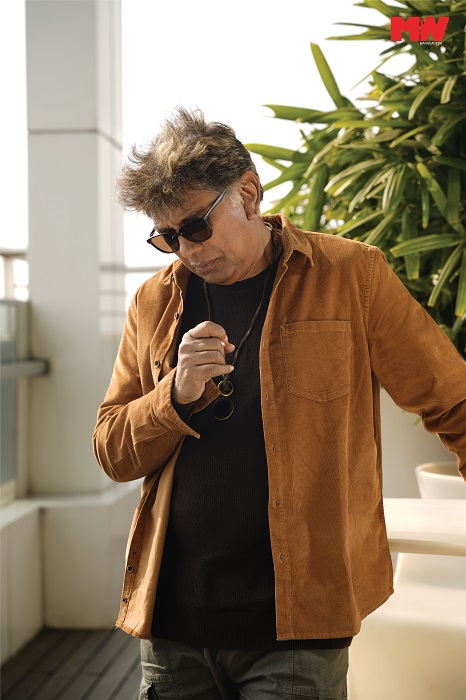
So it was a very positive time. Was it the same everywhere else?
Oh yes! When I look back now, I feel that, to be honest, the time itself was very inspiring and encouraging. I was still a student when I started designing book covers and illustrations. I tried introducing new styles and got tremendous support from eminent writers and famous publishers. My first novel was published in one of the most popular magazines. When I wanted to introduce a completely different trend in conducting magazine programs, BTV appreciated and accepted the idea with open arms.
I had no experience in writing TV dramas, but when I did write, respectable BTV producers readily produced them. The time was such that new concepts, novel ideas were appreciated and encouraged by all.
Abdullah Al Mamun was a big name in Bangladesh television. He was a famous actor, writer, director, TV producer, and also a great theater director. He belonged to one of the most famous theater groups “Theatre.” Even though I was from a different troupe, and was so much younger and relatively unknown, he still offered me the main character on television drama. Such were the times. There was no vanity or ego, people were just genuinely enthusiastic and intensely involved in working together for the betterment of the craft.
Even as a student, you were involved in various activities. Give us a glimpse of what other things you were interested in at the time.
In a student’s life, aside from studies, one also has various other interests and activities that help develop that person in many ways. I used to find poetry very appealing; so while still in Dhaka Art College, I started reciting poetry. I enjoyed conducting programs. I was also interested in book cover, poster designing, and illustration. My interests paved the way for me to get acquainted with writers, publishers, journalists, and cultural activists. This helped me in many ways, particularly in heightening my confidence. While still at Art College, I joined an organization which worked for the betterment of children’s literature and cultural activities named “Chander Haat.” Chander Haat was the children’s edition of the prominent daily newspaper Purbodesh. In fact, all leading daily newspapers at the time had these wonderful children’s editions to enhance cultural and literary activities, to enlighten the youth of this country.
When and how did your transition from stage to screen take place?
While still at Art College, I conducted a program on BTV for the annual exhibition of Dhaka Art College. Since then, BTV would call me to recite poetry every now and then. One of my such performances was a recital of Sukanta Bhattacharya’s poem “Atharo bochhor boyosh.” The eminent Abdullah Al Mamun happened to watch this performance. He summoned me, and without any preamble, he handed me a script, and said: “This will be recorded within a week. I am giving you the script, as rehearsals will begin tomorrow.” The script was that of Bertolt Brecht’s Rifle. This is how I started my journey as a television actor. My transition into films also happened as easily. Udayan Chowdhury, a screenwriter of repute, offered me a role in his Liberation War-based film, Daak Diye Jai. This was going to be actress Diti’s and my debut film. But after completing sixty percent of the shooting, the film got shelved for financial reasons. After a while, producer-director Kazi Zahir offered me the lead role in his film called Notun Bou with two top heroines of films and television of the time, Babita and Suborna Mustafa. Mainstream film producers inviting stage and television performers to play the lead roles in commercial cinema, seemed like a significantly inspiring change to me, so I happily agreed to do the film.
It wasn’t possible to take stage or television as a profession; whereas films could have been a prospective career choice for you. But you didn’t do it.
Initially I was interested in films. Syed Salahuddin Zaki after returning from Pune Film Institute made the movie Guddi; which added a new dimension to films. He started a film named Baraf with Champa and me in its lead roles. It was a very interesting subject. But unfortunately, this too got shelved for financial reasons. Abdullah Al Mamun made Dui Jeebon and it became a huge hit. Offers from acclaimed producers and directors of the industry, to act in commercial movies, started pouring in. The scenario seemed promising. I could have taken films as my career at this point if I wanted to. But at one point I felt that the regular commercial movies are not my cup of tea.
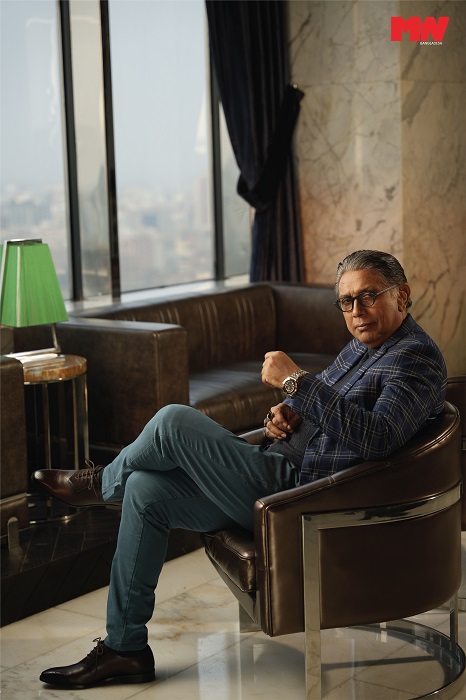
You were a part of the much-lauded Bohubrihi, which was the staple of television at one point. Could you share with us the experience of acting in that series?
I started acting for television in 1975. I had already acted in innumerable dramas; had the opportunity to work with the most respectable producers, do the best productions on BTV. But I had some reservations about signing up for a series. The idea of playing the same character day in and day out didn’t appeal to me. So, when I was offered this role of a doctor in Bohubrihi, I was not initially interested. However, Humayun Ahmed told me that this character will change as the series progresses. The role was of a doctor who falls in love and whenever he meets his lady love he gets so nervous that he makes ridiculous mistakes which generate humorous situations in the drama. People loved the play and the character got extremely popular. Following the positive response, the episode count was increased. However, since I was not seeing much of character growth in my role of the doctor, I decided not to extend beyond my initial commitment. So, I finished my commitment of acting on those 13 episodes and asked for writing my character out of the script after that.
Do you ever go back and watch those old roles? Would you do anything differently now?
I actually do watch my old work if they happen to come in front of me. I do not feel any reservations whatsoever towards these old works of mine. On the contrary, I feel proud that I got the chance to act in most of the best productions of Bangladesh television. That was the beginning of my acting life and I have tremendous respect for that time. I feel that I gave my best at the time and that was the best I could have done with the given experience. I’m extremely content with whatever I’ve done so far.
You worked for the TVC industry for a significant amount of time. Could you please share your first-hand experience of seeing such an industry starting in Bangladesh and evolving over time.
The mid-80s saw the blooming of the advertising scenario in our country. We aimed to highlight the product by presenting the information in the most entertaining way. We concentrated on making catchy, entertaining jingles and visuals. The approach was novel as well as informative. Clients, agencies, and audience – all were very appreciative and supportive of this new approach. TVCs became a part of great entertainment. At the same time, since we could offer a comfortable platform for models to work on, youngsters from respectable middle-class backgrounds started showing interest in this field. Models gained popularity, became stars. All this put together created great hype. People would take interest in TVCs, talk about them, and actually wait to watch them over and over again. That was actually the beginning of the golden era of the advertising industry.
Between the mid-80s and a large part of the 90s, the domestic film industry went through a slump, where cinema halls were no longer showing family-friendly films. Why do you think this happened?
I think this happened, because initially people in the film industry wanted to show their best work, and to produce quality work was their only focus. Over time, we saw that as the industry got larger, more and more film-makers and producers started thinking about ways to make more money with their films, and that is what led to the films we saw from the mid-80s to the 1990s. Wanting to make films that are more commercially profitable is not a bad thing per se, but it did lead to a certain quality of films getting a preference over others.
How has the taste of the film audience of Bangladesh changed over the years?
The cinema halls are getting demolished to build shopping malls. This is a clear implication that the number of moviegoers have dropped significantly. Today’s cineplex audience are extremely picky, they choose movies according to their taste. So, cinema is not an event in itself anymore.
The emergence of OTT platforms seems to have breathed new life into the entertainment sector. How are you finding it?
I think it is great that this new industry is developing. The most appealing part of the OTT platform is its ability to reach out to the international audience. Hence, the competition compels one to give his best shot, be it in writing, acting, or direction. You’ll see diversity in contents and novelty in concepts. And the characters created are so nuanced that it is a pleasure for the actors to play such diverse roles. At the same time, being able to reach out to more viewers is extremely satisfying for actors. However, I wish the writers, directors, and producers of this industry exercise caution while doing more work, to ensure that the industry does not devolve into such a state that content is being made for the sake of commercial purpose only. We have the examples of television and cinema shifting from a respectable pedestal to unreliability. And of course, we must keep in mind that this is an international platform and we are representing our country after all. Quality should always continue to be in focus.
Let’s focus on you now. How do you choose a script? What do you look for and how do you prepare yourself for a role?
I’ve been acting since 1975. I’ve played many roles in these numerous dramas. So naturally, at this point of life, I look for scripts that are unique in concepts and characters that are nuanced enough to inspire me.
The story itself and the character, his dialogue, all together lead to a character sketch you can do on your own. It gets completion when you coordinate the director’s vision of the character with your interpretation.
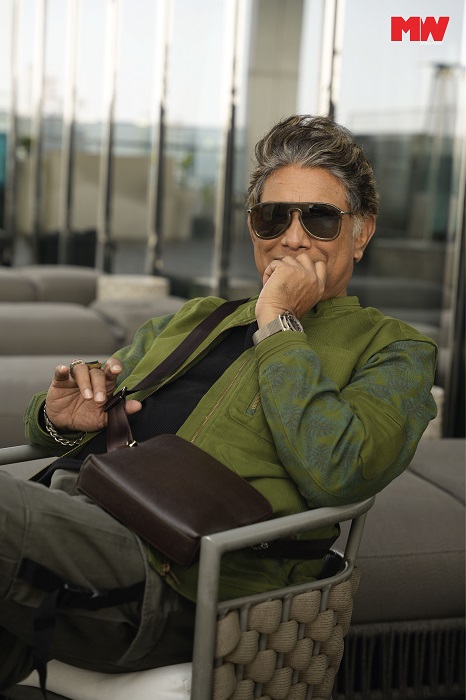
What’s your favorite medium to work in?
Actually, I do what I enjoy doing. I enjoy painting, writing, acting, directing, and conducting. I thoroughly enjoy – loving to do all this, and love to enjoy being able to do it all.
Who is one contemporary actor that you enjoy working with now?
I can’t mention any specific name. I thoroughly enjoy working with the new generation. Most of them are brilliant, creative, and talented. There’s so much scope for an actor to show his full potential now … that I tremendously miss having Humayun Faridi around.
Who is an international actor whose work you enjoy?
An actor has to prove his mettle to carve a niche for himself in today’s world. So almost all have great potential. I can name many. But at the moment I can think of actors such as Audrey Hepburn, Meryl Streep, Smita Patil, Alia Bhatt, Jack Nicholson, Sidney Poitier Naseeruddin Shah, Nawazuddin Siddiqui, and Amitabh Bachchan.
Is there a director you’ve been surprised by recently?
I enjoy working with the new generation directors. One has so much to learn from them. You get to gain a lot of new experiences there.
What is a role you haven’t tried yet but would like to?
I actually do not have such a role in mind. However, some of the characters I’ve portrayed recently were quite unique and I enjoyed doing something out of the book: Characters such as the role in Mostofa Sarwar Faruki’s Ladies and Gentlemen, Nuhash Humayun’s Pet Kaata Shaw and Amitav Reza’s Bodh.
What was it like actually being on the sets of Karagar?
It was certainly a very unique experience, as shooting was done in the old Central Jail. The makeup room was actually in the abandoned cell for convicts who had been given death sentence. To be in that room, and thinking about its old occupants, and what went on in their heads before their sentence was carried out, was a chilling experience.
What’s next for Afzal Hossain?
I’ve just finished working on Habibul Islam Habib’s film Japito Jeebon based on the famous novel by Selina Hossain. Another ongoing project where I am acting, is the film Aparajeyo directed by Syed Salahuddin Zaki and written by Faridur Reza Sagar. I am also working on City Gold, a short film directed by Shajal A Azad. I have also just signed One Eleven, a film directed by Qamrul Islam Rifat.
I have recently finished my first directorial venture, the film Maniker Laal Kaakra.





